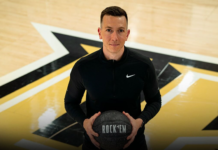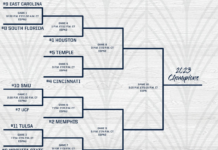Dressed in a black pinstriped button-down shirt, blue jeans and with his hair slicked back with gel, Kyle Israel dawns a different uniform than the one he wore just over three years ago.
The former quarterback for the UCF football team stares out onto the back terrace of his new restaurant, which is lined with yellow caution tape, and envisions the crowds of people and the up-scale bar and lounge stretched out over his 10,000-square foot patio.
Israel is a part owner and manager of a new restaurant downtown, Terrace 390, and he’s just one of many former UCF athletes finding life after athletics and adjusting to work away from sports.
For the former Conference USA champion, it was a tough move going from football to the real world.
“One of the things I initially struggled with is that pretty much from where you eat to where you sleep, is pretty much planned out for you for four years,” Israel said. “A lot of times that can be difficult when you step out of that into the real world and you have to start planning things on your own and figure out which direction you want to go in life. That’s when it becomes tough.”
Mike O’Donnell took a different route.
O’Donnell, who played point guard for the UCF basketball team from 2005-08, is transitioning from the court to press box, a path many former athletes follow after college and professional sports.
“I’ll tell you it’s pretty interesting,” O’Donnell said. “I don’t wake up with bruises or stitches and concussions anymore, which is nice. It is interesting in many ways.”
O’Donnell was approached by Marc Daniels, the voice of UCF sports on IMG radio, to be his color analyst. Shortly after that, Bright House Sports Networks came calling and asked him to do some television.
Mike the ball player became Mike the broadcaster.
“Really, when it comes down to it, it is just you and a good friend talking about the game from a coaching aspect,” O’Donnell said of broadcasting. “It has been a lot of fun analyzing the games and talking about it.”
For the past five months, Israel has been in his restaurant every day trying to get it open. He’s had to learn everything in the industry from how to close a lease to financial analytics of a business. All along, the lessons he’s learned in football have applied.
“Obviously, I’m working with partners in a business and we work as a team,” Israel said. “You don’t always agree. Five guys that have different opinions about a restaurant can get distracting and can cause some controversy, but at the same time you have to move past it. That happens in football quite a bit.”
Instead of being coached, Israel has had to learn to be the coach at his restaurant. He had to hire the staff and work on organizing his staff together. He’s always wanted to be a coach, and now is his chance, just in a different setting.
“In a football game you have coaches that are preparing you to be as prepared as possible, but when you are an owner of a restaurant you are the one responsible for preparing the team,” Israel said. “To be in this position with the inexperience that I do have in actually running a restaurant logistically, I am going to be far more nervous for my staff [when we open] and hoping that I prepared them well to react and work well with our customers rather than worrying about my performance.”
Basketball has helped O’Donnell behind the microphone as well. Being a point guard, he had to know what every person on the court was doing in the game at all times. That’s helped him in analyzing plays better on the court.
“I was absolutely insane about watching film and I would go in with coach and I would watch film constantly with him and breaking down situation,” O’Donnell said. “I think it has helped me while I was in the game watching situations because you can see things happening ahead of time. I have a lot of work to do in broadcasting, but being a point guard and being a avid student of watching film has definitely helped me.”
Going pro was always a dream of Israel’s. He went over to Germany for a year and played overseas after college to work on his game. He’s explored options of playing arena and minor league football. Just a few weeks ago, he was offered a chance to tryout for the AFL’s Orlando Predators roster. Then, he had to make one of the hardest decisions of his life: turning the page on playing pro football.
“It was a really tough decision,” Israel said. “I talked to my dad about it and my business partners and they all said if that’s what I wanted to do then go for it. At the same time, to have put so much work into something for four or five months and to not be there to finish it off and at that not even be guaranteed a roster spot for the Predators, there was just too many variables to make that move.”
As for O’Donnell, he never had interest in playing professionally. He turned down offers overseas to pursue broadcasting, but it didn’t take long for him to be featured on ESPN’s “Sportscenter”, and this time not for his play on the court. It all came during a game against Marshall when Marcus Jordan made a play that ended up on Top 10 plays. The anchors decided to play O’Donnell’s call over the highlight, something that was broadcasted over national television. It was a moment he’ll never forget.
“For some reason, I don’t know who I was channeling but I said ‘Oh no he didn’t’ right after he made the play in a little bit of a twangy voice,” O’Donnell said. “I can say I have no idea why I did it, but it was on nationwide for everyone to hear it and even the ESPN guys were like ‘I can’t believe he said oh no he didn’t.’
“A 25-year-old young Irish Catholic saying a quote like that is just hysterical. I don’t know if I’ll ever say that again.”
Both guys miss playing the game, but they are enjoying life after their respective sports. O’Donnell hopes to keep improving and one day make it on ESPN, but this time for his talents.
“If we are going dreams, it would be to be a college basketball analyst on ESPN,” O’Donnell said. “It would obviously be a dream job.”
As for Israel, he just hopes his dreams of seeing his patio full with customers becomes a reality.
“I think it’s going to be really cool as we get into June, July and August when I can kind of sit back … and I can kind of walk in when I’m not working and I see this place with a lot of people in it and people enjoying themselves,” Israel said. “I did everything from paint the grout in the women’s bathroom a different color to taking down the ceiling tiles. Just to kind of have a fingerprint on something is more cool than anything and I’ll hopefully be seeing people enjoy what I have done.”






